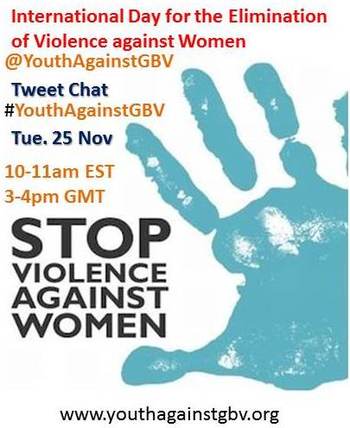
There were eight of them from Botswana, the DRC, Kenya, Liberia, Malawi, Nigeria, Sierra Leone, and Uganda. Changu had worked in a women's shelter. Brian used sports to teach alternatives to violence. Jestina, Faith, Mweta, and Samuel were sexual and reproductive health educators and advocates. Isaiah taught girls and boys to use technology for grassroots organizing. Mireille mobilized men in support of women's rights.
They met in the U.S. on a prestigious fellowship. Sharing their experiences with one another about how violence against women and girls was holding back their countries' progress led them to form the Youth Alliance Against Gender-Based Violence.
Isaiah Owolabi, one of the youth leaders, states:
"Gender-based violence is not a women's issue, it is a development challenge. If we allow GBV to thrive, the impact will negatively affect the world we live in, the one we hope to inherit, and even the one that our children will see."
Encompassing issues from domestic and intimate partner violence to sexual harassment and exploitation, gender-based violence (GBV) is a vast global problem. But the ways it manifests differs from country to country. That's why locally driven solutions are so important, as are the fresh perspectives youth can bring.
"If we harness the energy, creativity, and passion of young people everywhere in Africa, we will be able to catalyze grassroots actions to prevent and ultimately stop GBV," says Mr. Owolabi. "We want young people all over Africa to start speaking about what can be done to end GBV."
But why an alliance? "When individuals and organizations come together to tackle a challenge, it becomes easier to overcome. With proper coordination and character we can make GBV history."
Mr. Owolabi highlights the importance of behavior change in this work:
"We need individuals to take practical steps to stop it. If we all decide--men, women, boys, and girls--never to hurt anyone physically, psychologically, or sexually, then we stop the cycle of violence."
The Alliance is using social media to raise awareness around GBV. But they are also critical of the role both traditional and social media have played to date.
"The media needs to step up their game with constructive reporting and education programs on GBV-related issues. Radio, TV, social media gurus, and newspaper editors and columnists all need to join to stop GBV," he says.
Engaging African governments is an especially pressing issue, stresses Mr. Owolabi:
"We need government commitment to ensure that they don't just make policies, but also implement them. They need to incorporate support for survivors into the legal, health, and other sectors. Perpetrators of violence should be punished or counseled when needed. This isn't supposed to be a promise to ensure votes for another election. Governments should make it core of their agenda."
Changu Siwawa, another Alliance organizer, adds about the importance of working with traditional leaders as well as governments in order to identify harmful practices. "It's crucial to use cultural dialogues to address GBV."
As they continue to add a broad spectrum of new members to the Alliance, Mr. Owolabi emphasizes the collective approach needed to succeed. "This is not just about young people. It is not just about women. It is about everyone."
The Youth Alliance Against Gender-Based Violence invites every young person and organization combatting GBV in Africa to share their events, success stories, and solutions. The Alliance can be reached on Facebook, Twitter, or email (youthagainstgbv@gmail.com).
The Mandela Washington Fellowship for Young African Leaders is a program of the U.S. government and supported in its implementation by IREX.
